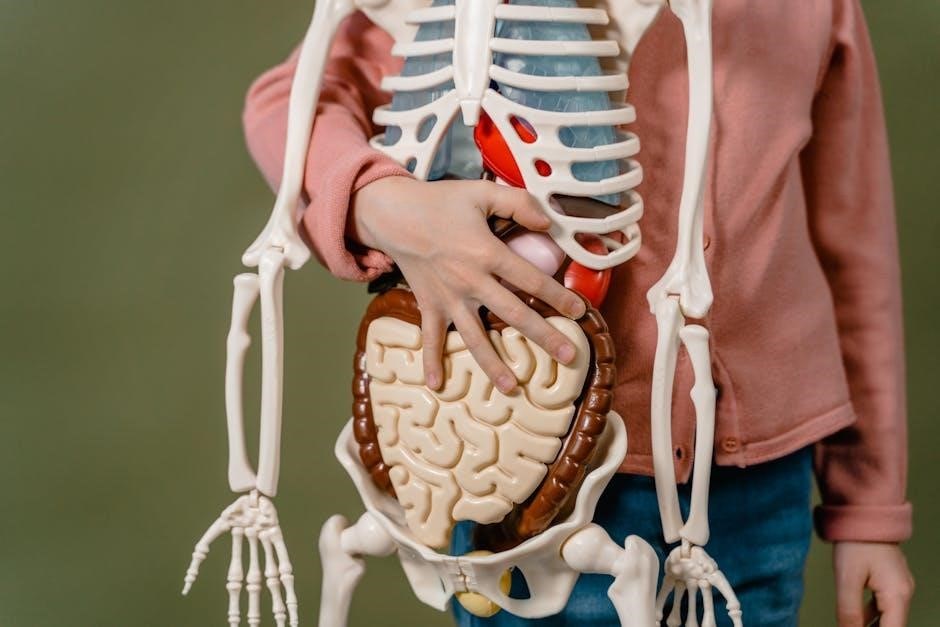Welcome to the IB Biology HL study guide, designed to help students master the challenging yet rewarding curriculum. This guide provides a comprehensive overview of core topics, key concepts, and essential skills required for success in the course. By focusing on critical thinking, experimental techniques, and interdisciplinary connections, it equips students with the tools needed to excel in their studies and exams.
1.1 Overview of the IB Biology HL Course
The IB Biology HL course is a rigorous, two-year program designed for students with a strong interest in life sciences. It covers core topics such as cell biology, genetics, evolution, and ecology, along with optional topics like neurology or biotechnology. The course emphasizes critical thinking, experimental design, and data analysis. Students engage in hands-on laboratory work and develop skills in scientific inquiry. With 240 recommended teaching hours, the HL course offers deeper exploration and application of biological concepts compared to SL. This guide aligns with the syllabus, ensuring comprehensive preparation for exams and beyond.
1.2 Key Skills and Concepts in IB Biology HL
In IB Biology HL, students develop critical thinking and scientific literacy through hands-on experiments and theoretical studies. Key skills include designing experiments, analyzing data, and evaluating scientific research. Core concepts span cell biology, molecular genetics, evolution, and ecology, with optional topics like neurology or biotechnology. The course emphasizes understanding biological processes, ethical implications, and global issues. Mastery of these skills and concepts prepares students for university-level studies and fosters a deeper appreciation of life sciences. This guide ensures comprehensive coverage of all essential areas for exam success.
1.3 Importance of the Study Guide for Success
This study guide is a vital resource for IB Biology HL students, providing a comprehensive overview of the syllabus and key concepts. It aligns with the latest curriculum, offering detailed explanations, diagrams, and exam-style questions to reinforce learning. The guide helps students identify knowledge gaps, develop effective study habits, and prepare confidently for assessments. By focusing on clarity and depth, it ensures students are well-equipped to tackle complex topics and achieve their full potential in the course.

Core Topics in IB Biology HL
The IB Biology HL core topics cover cell biology, molecular biology, genetics, evolution, biodiversity, plant biology, and ecology, providing a solid foundation for understanding life processes.
2.1 Cell Biology and Biotechnology
Cell biology explores the structure, function, and processes of cells, including membrane transport, cell division, and signaling. Biotechnology applies these principles to develop tools like PCR, CRISPR, and microscopes; Understanding cellular mechanisms is crucial for advancing medical research, genetic engineering, and biotechnological innovations. This section delves into the dynamic nature of cells and their applications in modern science, providing foundational knowledge essential for IB Biology HL students.
2.2 Molecular Biology and Genetics
Molecular biology examines the structure and function of biomolecules like DNA, RNA, and proteins, focusing on processes such as replication, transcription, and translation. Genetics explores inheritance, variation, and gene expression, including Mendelian and non-Mendelian patterns. This section emphasizes the central dogma, genetic engineering techniques like CRISPR, and the ethical implications of genetic advancements. Understanding these concepts is vital for grasping evolutionary mechanisms and biotechnological applications, making them foundational for IB Biology HL students.
2.3 Evolution and Biodiversity
Evolution and biodiversity are cornerstone concepts in IB Biology HL, exploring how life adapts and diversifies over time. Key topics include natural selection, speciation, and phylogenetic relationships. The study of biodiversity encompasses species, genetic, and ecosystem diversity, highlighting the importance of conservation amid threats like habitat loss and climate change. Understanding evolutionary mechanisms and biodiversity’s role in maintaining ecosystem balance is crucial for addressing global environmental challenges and promoting sustainable practices. This section provides a detailed analysis of these interconnected themes, essential for a holistic understanding of life sciences.
2.4 Plant Biology and Ecology
Plant biology and ecology focus on the structure, function, and interactions of plants within ecosystems. Topics include transport systems in plants, such as xylem and phloem, and photosynthesis, emphasizing light-dependent and Calvin cycle reactions. The study also covers plant responses to stimuli, like tropisms and hormone regulation. Ecological concepts explore energy flow, food webs, and nutrient cycling, while addressing human impacts on plant communities and biodiversity. Practical investigations and case studies highlight the importance of sustainable practices in managing ecosystems and conserving plant species. This section integrates laboratory and fieldwork to deepen understanding of plant ecology and its real-world applications.

Option Topics in IB Biology HL
The option topics allow students to explore specialized areas of biology in depth. These include Neurology and Behavior, Biotechnology and Medicine, and Ecology and Conservation, focusing on advanced concepts and applications.
3.1 Neurology and Behavior
This section delves into the intricate world of neurology and behavior, focusing on how the nervous system controls various physiological processes. Students explore the structure and function of neurons, synaptic transmission, and the role of hormones in regulating behavior. The option also examines complex behaviors such as learning, memory, and sleep, providing insights into neuroplasticity and the biological basis of psychological disorders. Practical investigations and case studies enhance understanding of these fascinating topics, preparing students for advanced discussions in neuroscience and related fields.
3.2 Biotechnology and Medicine
This section explores the revolutionary impact of biotechnology on medicine, focusing on innovations like genetic engineering, stem cell therapy, and personalized medicine. Students analyze how these advancements diagnose and treat diseases, improve drug development, and enhance agricultural practices. Practical applications, such as CRISPR technology and monoclonal antibodies, are highlighted, along with ethical considerations surrounding biotechnological interventions. This option bridges science and real-world applications, preparing students to critically evaluate the benefits and challenges of modern biotechnology in improving human health and well-being.
3.3 Ecology and Conservation
This section delves into the intricate relationships within ecosystems and the pressing need for conservation. Students explore biodiversity, ecosystem services, and the impact of human activities on the environment. Key topics include habitat restoration, endangered species management, and climate change mitigation. The guide emphasizes sustainable practices and ethical considerations in conservation biology, preparing students to address global environmental challenges effectively. Real-world case studies and practical applications are used to illustrate the importance of preserving ecological balance for future generations.

Internal Assessment (IA) in IB Biology HL
The IA is a critical component of IB Biology HL, requiring students to conduct independent research and present findings. It assesses scientific inquiry, analysis, and communication skills.
4.1 How to Approach the IA
Approaching the IA in IB Biology HL requires careful planning and execution. Start by understanding the requirements and selecting a research question aligned with the curriculum; Conduct thorough background research and design a clear experimental plan. Ensure ethical considerations are addressed and data collection is systematic. Analyze results critically, drawing meaningful conclusions; Avoid common mistakes like poor time management and lack of depth in analysis. Utilize study guides and resources for guidance on experimental design and data interpretation. Regularly review and refine your approach to meet the highest standards.
4.2 Research Methods and Data Analysis
For the IA, selecting appropriate research methods is crucial. Experimental designs, observations, and data collection techniques should align with the research question. Use tools like graphs and statistical tests for quantitative analysis, while qualitative methods may involve observations or interviews. Triangulation of data enhances validity. When analyzing, ensure data is presented clearly, with proper interpretation and discussion of trends. Avoid bias and address limitations. Utilize study guides for examples of effective data analysis and interpretation. Properly citing sources and maintaining ethical standards in research methods is essential for credibility.
4.3 Writing the IA Report
Writing the IA report requires clear and concise communication of your research. Ensure the report is well-structured, with sections including the introduction, methods, results, discussion, and conclusion. Use clear headings and subheadings for organization. Data should be presented accurately, with graphs and tables where appropriate. Discuss your findings in relation to your hypothesis and broader biological concepts. Avoid unnecessary jargon and maintain a formal tone. Adhere to the word limit and formatting guidelines provided by the IB. Properly cite all sources to maintain academic integrity and avoid plagiarism.

Extended Essay (EE) in IB Biology HL
The Extended Essay is a 4,000-word independent research paper. It involves selecting a research question, conducting experiments, collecting and analyzing data, and writing a structured essay. The EE assesses critical thinking, research skills, and the ability to present findings clearly and coherently, preparing students for academic writing at the university level.
5.1 Choosing a Research Question
Selecting a research question is the foundation of a successful Extended Essay in IB Biology HL. It should be specific, testable, and aligned with the syllabus. Students should choose a topic that genuinely interests them to maintain motivation throughout the research process. The question must be feasible within the time and resources available, ensuring it can be thoroughly investigated. Additionally, it should demonstrate originality and contribute meaningfully to the field of study. Consulting with a supervisor early on can help refine the question and ensure it meets IB requirements.
5.2 Conducting Experiments and Collecting Data

Conducting experiments and collecting data are critical steps in the Extended Essay process for IB Biology HL. Students should design experiments with clear objectives, ensuring methods are precise and repeatable. Proper use of laboratory equipment and adherence to safety protocols are essential. Data collection must be systematic, recording both qualitative and quantitative observations. Ethical considerations, such as minimizing harm to organisms, should always be prioritized. Accurate and organized data collection lays the foundation for robust analysis and valid conclusions, enabling students to address their research question effectively.
5.3 Writing the Extended Essay
Writing the Extended Essay (EE) in IB Biology HL requires meticulous planning and execution. The essay should be 4,, structured with an abstract, introduction, research question, methodology, results, discussion, and conclusion. Proper citation and referencing are essential to avoid plagiarism. Students must ensure their essay aligns with the research question, maintaining logical flow and coherence. Revisions and proofreading are critical to refine arguments and enhance clarity. Adherence to IB guidelines and formatting requirements is vital for a high-quality submission.

Exam Preparation and Revision Strategies
Effective exam preparation involves mastering past papers, understanding question types, and applying time management strategies. Utilize study guides and focus on high-yield topics for success.
6.1 Effective Revision Techniques

Effective revision techniques for IB Biology HL involve active recall, spaced repetition, and practice exams. Use flashcards for key terms and concepts. Create detailed notes and summaries, focusing on high-yield topics. Engage in group discussions to clarify doubts and reinforce understanding. Regularly review past papers to familiarize yourself with question formats and timing. Prioritize experimental questions and case studies, as they are frequently assessed. Consistency is key; allocate specific times for revision and stick to your schedule. Identify and target weak areas to improve efficiency and confidence.

6;2 Time Management for Exam Success
Effective time management is crucial for success in IB Biology HL exams. Create a structured study schedule, allocating specific times for each topic and practice. Break study sessions into manageable chunks, focusing on high-yield areas. During exams, read questions carefully, allocate time proportionally, and prioritize core concepts. Use timers to simulate exam conditions during practice. Balance between theoretical understanding and practical application to maximize efficiency. Regularly review progress and adjust your plan to ensure comprehensive coverage of the syllabus.

6.3 Understanding the Exam Format and Question Types
The IB Biology HL exam consists of multiple sections, including multiple-choice questions, short-answer questions, and extended-response essays. Familiarize yourself with past papers to recognize common question formats and content focus areas. Practice interpreting data, graphs, and experimental results, as these are frequently assessed. Understanding the command terms and marking criteria is essential for tailored responses. Regularly review the syllabus to align your study with exam expectations. Utilize study guides and online resources to refine your understanding of question types and improve exam performance.

